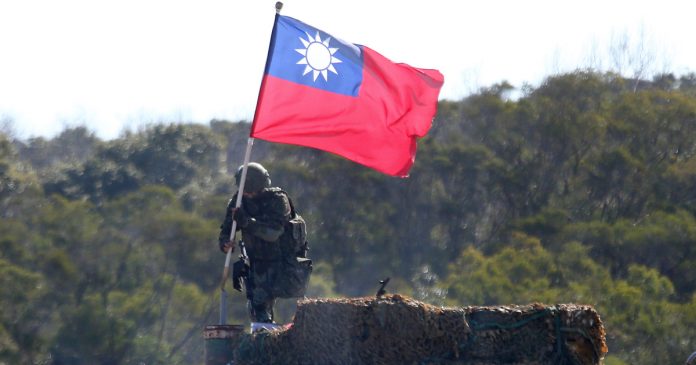[ad_1]
The United States reaffirmed its support for Taiwan after eight Chinese bomber planes and four fighter jets entered the island’s air defence identification zone.
The US Department of State said on Saturday it “notes with concern the pattern of [China’s] ongoing attempts to intimidate its neighbours, including Taiwan”.
“We urge Beijing to cease its military, diplomatic, and economic pressure against Taiwan and instead engage in meaningful dialogue with Taiwan’s democratically elected representatives,” spokesperson Ned Price said in a statement.
Washington will continue to deepen ties with Taiwan and ensure its defence from Chinese threats while supporting a peaceful resolution of issues between the sides, the statement said.
The U.S. urges Beijing to cease its military, diplomatic, and economic pressure against Taiwan and instead engage in meaningful dialogue with Taiwan’s democratically elected representatives. We support a peaceful resolution of cross-strait issues. https://t.co/o2rZL4onJ8
— Ned Price (@statedeptspox) January 24, 2021
“Our commitment to Taiwan is rock-solid and contributes to the maintenance of peace and stability across the Taiwan Strait and within the region,” it added.
There was no immediate response from China.
Taiwan’s Ministry of National Defense said China sent eight bombers capable of carrying nuclear weapons and four fighter jets into airspace just southwest of the island, part of a long-standing pattern of Chinese incursions aimed at pressuring the government of President Tsai Ing-wen into caving to Beijing’s demand that she recognise Taiwan as a part of Chinese territory.
The latest Chinese overflight came on the heels of President Joe Biden’s inauguration, emphasising the island’s enduring position in the panoply of divisive issues between the sides that also include human rights, trade disputes and, most recently, questions about China’s initial response to the coronavirus pandemic.
Biden’s administration has shown little sign of reducing pressure on China over such issues, although it is seen as favouring a return to more civil dialogue.
Taiwan’s foreign ministry expressed its thanks for the show of US support on Sunday, adding it would work closely with the Biden administration to strengthen their partnership.
Lo Chih-cheng, a senior legislator for Taiwan’s ruling Democratic Progressive Party who sits on parliament’s foreign affairs and defence committee, also told Reuters news agency that China was trying to deter the new US government from backing the island.
“It’s sending a message to the Biden administration,” he said.
Taiwan and China separated amid civil war in 1949 and China says it is determined to bring the island under its control, by force if necessary.
The US switched diplomatic recognition from Taipei to Beijing in 1979 but is legally required to ensure Taiwan can defend itself and the self-governing democratic island enjoys strong bipartisan support in Washington.
Emily Horne, spokeswoman for the White House National Security Council, also reaffirmed the US’s commitment to Taiwan after the island’s de facto ambassador in Washington, Hsiao Bi-khim, attended Biden’s swearing-in on Wednesday.
In a final swipe at China, the Trump administration’s outgoing UN ambassador tweeted that it was time for the world to oppose China’s efforts to exclude and isolate Taiwan, drawing sharp criticism from Beijing.
Ambassador Kelly Craft accompanied the tweet with a photo of herself in the UN General Assembly Hall, where the island is banned.
She carried a handbag with a stuffed Taiwan bear sticking out of the top, a gift from Taiwan’s representative in New York, Ambassador James Lee.
Tsai has sought to bolster the island’s defences with the purchase of billions of dollars in US weapons, including upgraded F-16 fighter jets, armed drones, rocket systems and Harpoon missiles capable of hitting ships and land targets.
She has also boosted support for Taiwan’s indigenous arms industry, including launching a programme to build new submarines to counter China’s ever-growing naval capabilities.
China’s increased threats come as economic and political enticements bear little fruit, leading it to stage war games and dispatch fighter jets and reconnaissance planes on an almost daily basis towards the island of 24 million people, which lies 160km (100 miles) off China’s southeast coast across the Taiwan Strait.
[ad_2]
Source link











